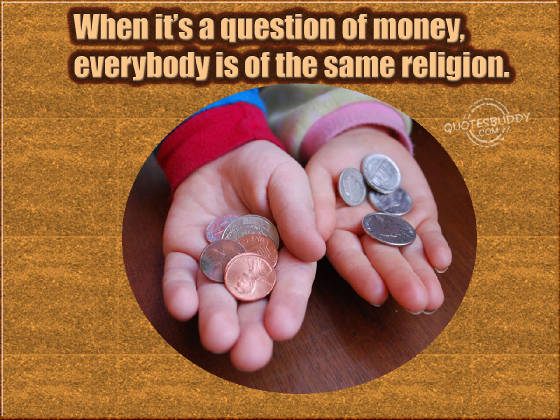|

Business of Evangelism Religion
Theologians
preach that religion is based upon faith, while economists depict that the world runs on money. Many confess that ministries
repeatedly lose their way, while no one really disputes churches operate as business enterprises. The actual purpose of such
churches varies with different dominations, but organized religion frequently functions more like a "PC" soapbox
than a congregation of moral values. Often, it is all about the money, because they operate their worldly business, even if
they profess to be a spiritual mission. The vast temple empires of modern day evangelism ignore the bible verse that talks
about "we are in the world, but not of the world". Joining
the ranks of the Political Toadies and a
Broken Down System, warn of the results from their secular endeavors. "The moral majority
back in the heyday of Farwell and Robertson promoted a pro American viewpoint. Thirty-five years later, the gospel message
of moral character is silent. Only the promoters of fundraising appeals and the accountant’s 501 C3 filings are preached
from most pulpits. The Pharisees that populate the secular congregations are eager to send their heretical voices to lobby
on K Street."
Since medieval times, expansive tracts
of property were under the control of clergy. Today the difference is that institutional churches are in decline, while resourceful
organizations that are in the marketing trade of pitching a religion, are building grand enterprises. Back in 1987 that great defender of traditional values, Time Magazine wrote in Religion: Enterprising
Evangelism about a trend that has over grown in the last twenty-six years. "Televangelism
is a special kind of big business. In less than two decades, the vocation of preaching the Word of God via video has grown
from hardscrabble beginnings into far-flung real estate and broadcast empires with assets ranging in the hundreds of millions
of dollars. In almost every instance, those holdings are dominated by a single dynamic individual who decides how the money
will be spent and who strives, above all, to keep vital donations flowing from the faithful."

Buying
salvation with indulgences updated for the electronic age. Back when the Catholic Church was the universal way of selling
the passage key into heaven, raising money was a full time business. Guess Luther, Calvin and Knox missed the renaissance
version of the Infomercial. In Bloomberg’s Business Week, writing
about a different tribe, How the Mormons Make Money, we get a sense that Jews have real competition in the synagogue business. "It’s
perhaps unsurprising that Mormonism, an indigenous American religion, would also adopt the country’s secular faith in
money. What is remarkable is how varied the church’s business interests are and that so little is known about its financial
interests. Although a former Mormon bishop is about to receive the Republican Party’s presidential nomination, and despite
a recent public-relations campaign aimed at combating the perception that it is "secretive," the LDS Church remains
tight-lipped about its holdings. It offers little financial transparency even to its members, who are required to tithe 10
percent of their income to gain access to Mormon temples."
Applying
the term evangelism to the Jewish tradition may seem to be a misplaced association. However, any discussion about the business
of religion needs to include this mindset. Eric Simon in Money, Money, Money is most blunt in his viewpoint. "Judaism is very realistic about money and business. It knows that much of our daily
lives are involved with money. And so, just like waking up, just like eating, and just like speaking, there is a religious
way to act with money, a religious way to do business. In fact, the largest of the four sections in the classic text of halacha,
the Shukhan Arukh [Code of Jewish Law, by Rabbi Yosef Caro], is about business. To go even further, the Talmud tells us that
the first question we will be asked at the Heavenly Court will be: "Did you conduct your business affairs in a fair manner?"
The bottom line is this: to be religious Jews, we are not
supposed to isolate ourselves on a mountaintop and meditate, nor are we to take vows of poverty -- rather, we are supposed
to get out into the world, interact with it, and elevate the mundane." This
is a stark departure from the Christian convention. Yet, how many Dispensational Sermonizers seem to have more in common with
Talmudic Rabbis, than the Franciscan tradition of the current Pope? If the "winning or revival of personal commitments
to Christ" is the primary definition for evangelism, the second meaning - militant or crusading zeal –
seems to be the prevailing motivation in the pursuit of spreading the gospel in the business of religion. The essay, Where are the Clerics?, reflects upon the nature of religious congregations compliance with the
requirements of government, effectively licensing, their operation. "For
more than thirty years, a consistent slide in religious leadership has taken over the institutional Churches in America. Once
upon a time, their mission was preaching the gospel. Today the assignment is to get and keep tax-exempt status. The holy grail
is an IRS 501 (c) (3) non-profit tax exempt corporation. Incorporation, of any kind, accepts the rule of the State, over an
organization. Why in the world (certainly not a requirement of heaven) would an assembly of believers consider themselves
a 'trust' of the government?"
Most are familiar with Ephesians 6:12 - For we wrestle not against flesh and blood, but against principalities,
against powers, against the rulers of the darkness of this world, against spiritual wickedness in high [places]. Nevertheless,
the darkness blinds the evangelists who focus upon building crystal cathedrals or apocalyptic enterprises. What is next, the
prospect of paying for the Ted Haggard app for your smart phone?
Passing the plate during church services might not appeal to everyone much
less tithing ten percent. Although, funding ministries is a continual challenge, the true business of religion is the saving
of souls. Just maybe, the critical question at the pearly gates has nothing to do with money. James
Hall – August 14, 2013
Discuss or comment about this essay on the BATR Forum
|

